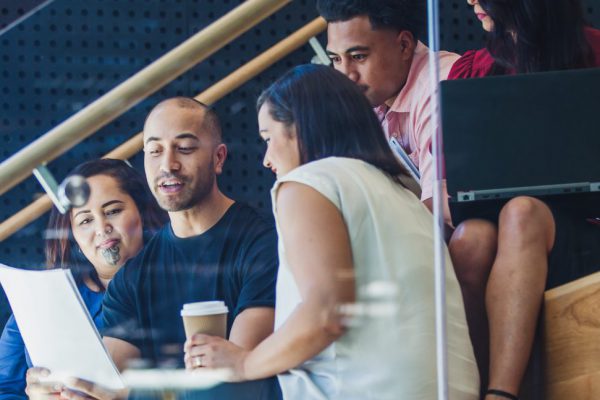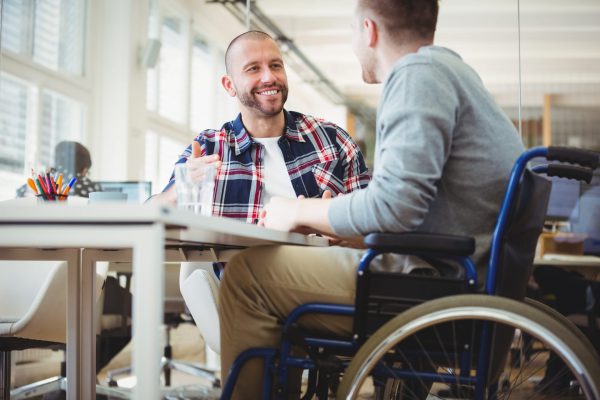Empower me
-
Being part of a team or group
Being part of work or sports teams, and other groups can help you form a sense of belonging. Participants talked about the positive impacts of groups which authentically supported their diversity and encouraged learning about each other's cultures. Working together with common purpose can create positive experiences and lasting friendships and space to just be with ‘people like me’.
We promote a very inclusive ethos in our club. Nobody should be sitting alone, if you see that, go and find something to communicate to them
-
We promote a very inclusive ethos in our club. Nobody should be sitting alone, if you see that, go and find something to communicate to them
-
In the disability world, not having barriers to get together where we're not judged for being autistic. I am a volunteer coordinator with [disability] doing youth events such as sensory tours to Te Papa. So much fun to be with 'blindies' and be a community.
-
By getting into employment with my limited English, I feel I belong when I am treated equally, and when we get the training on the job and even get a promotion. This is true for the drama kids too - they form a tight-knit group. They also deal with confronting topics in the material they perform so that helps them think about these topics.
-
So luckily [in school], I was in a few football teams, that was really great and positive. The sailing teams and down in the yacht club: nice sense of helping each other out. The number of events and opportunities to volunteer [in Taupo] is huge and that gives us opportunity to belong, e.g. you can host an athlete.
-
When I’m in places where there are people I don’t know, that come from different ages, there’s enough of a background [in terms of the workplace, the common health goal] that I feel belonging.
-
At work, I feel like I belong because there’s things, I feel like I’m there to help, to serve. To serve my people. Do I belong there? I know I fit in because I’m Māori and it’s my iwi. I feel like I belong when I’m supported by our peers [who also experience mental distress].
-
-
Putting energy and effort in
The energy you put into personal interests, and your efforts when contributing to shared activities can help you feel belonging. Participants shared many examples - like immersing themselves in arts and crafts, to learning about history or culture. Participants also spoke about how they felt belonging through efforts they put into meeting new people and contributing to a community.
I was older. I wasn’t working. So, you had to be really conscious about doing it yourself. (e.g. getting involved in organisations and activities).
-
I was older. I wasn’t working. So, you had to be really conscious about doing it yourself. (e.g. getting involved in organisations and activities).
-
We had a friend, an ambassador of the West Coast. Would always invite new people to her house, introduce them to like-minded people. Died 2 years ago. Had a big impact, was a teacher. Big contributing factor to making a lot of people feel welcome. Acknowledged people with special abilities eg. found out I could sew so hired me to make some cushions. Was well-travelled, social, loved to get to know people.
-
The idea of investment in a certain area or community is a way of building up identity. The investment I put into Māori identity. I have this white privilege and being able to prosper generally, coming into this Māori community, I have to work hard. I have to learn the language and get involved. I have to work hard to get that acceptance and get that sense of belonging.
-
A sense of choice and intentionally choosing to belong and putting the intention of belonging into a place. Often that’s hard. Places aren’t often open. When I was moved to Wellington, within 6 months I was the co-director of [xx] festival. I put my hand up. The response was a feeling of acceptance and wholeness, asking what I wanted to do.
-
-
Supporting others in practical and proactive ways
Supporting others’ needs in practical and proactive ways can help create a sense of belonging. Participants shared stories about taking time to have a good conversation with someone, sharing languages and other skills, and creating spaces for social connection. Many participants also spoke about how important it was to be able to contribute to society through their work and volunteer roles.
When I can contribute to society or others - individually or collectively.
-
When I can contribute to society or others - individually or collectively.
-
The isolation factor is particularly important for our people who have mental health challenges. My door is always open. In a place like this, you never know who is going to turn up and what they might need. You might just have to give a listening ear, a cup of tea, kai. Sometimes we can’t be the ones to provide physical assistance, but can refer [to other agencies].
-
Coming here as a refugee, I felt I belong to society when I find some opportunity to do something to contribute to the community. I’m working as volunteer, teaching our language to Arab children. I’m happy to do that. I worked a short time with Red Cross, with former refugees, I work in the office as admin assistant.
-
I was extremely lucky with [xx] school, he started ticking at 3.5 years. At 6, he developed quite big ticks. We had an awesome teacher at the school and picked it up and talked us through it. Awesome teachers - email when we need to, quite open, and will give me email updates at the end of the day.
-
As part of the rollout of what happened in Christchurch, we started putting friendship benches. Village atmosphere. People after work would sit around a tree and exchange ideas.
-
Social isolation has taken us away from that, and we don’t know each other. Community friendship benches, businesses have supported. Aborigines have donated a bench. Trying to build up a momentum of inclusiveness and social isolation.
-
-
Being able to choose for yourself
When you are able to choose for yourself, when you have agency, can help you feel belonging. Participants spoke about how being supported by others helped them make challenging decisions. Many talked about how meaningful advice and support from others helped them through their personal journeys.
My son - at the beginning of the school year - was able to say: I have Tourette’s. He met with the teacher and he was able to say to her, ‘I know when I need to get away from the group and pull away from the business so I can do my work’. That felt empowering to him, that he could do that.
-
My son - at the beginning of the school year - was able to say: I have Tourette’s. He met with the teacher and he was able to say to her, ‘I know when I need to get away from the group and pull away from the business so I can do my work’. That felt empowering to him, that he could do that.
-
It’s the common denominator of coming from adversity. Anyone within the disability community would have had that baseline drive to overcome diversity, barriers, stigma. That’s where I thrive quite heavily. Proving stigma wrong, proving stereotypes wrong.
-
Or when I’ve seen it on the other side, as a health professional going into an environment. It works well when the whole family is included in the decision making. Where there are complaints, that hasn’t happened, they didn’t feel included. It’s about having that common goal. When I’ve seen it work well, it’s not just about including everyone, but it’s about sharing a common goal. That the goal is made by the [people] there. Having that common goal and that honesty.
-
It’s a hard question because in Hungary I got bullied and now I choose to be happy and I am resilient. I am very happy and everyone was very supportive and I didn't feel like I was a migrant. I’m very lucky.
-
I learned a long time ago that I had desires and aspirations and that they couldn’t be realised within a contract (work) and that created barriers, barriers to growth, barriers to empowering your staff. I took a risk — I created an independent practice. Māori men traditionally operate in hapu-whanau, a collective of Māori men. But that creates a barrier because I took my initiative to stand outside the collective.
-






